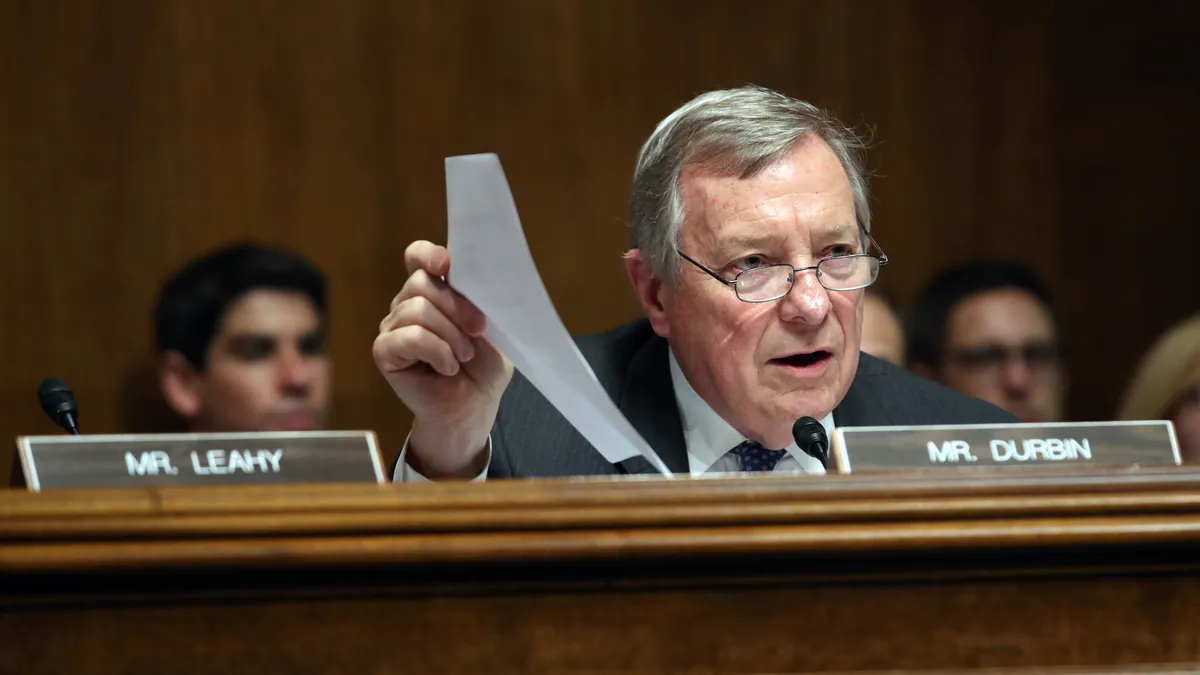Democratic Sen. Dick Durbin lambasted impending credit card fee increases and joined with his Republican colleague Roger Marshall to advocate for their bill seeking to rein in the card networks.
In a post on the social media site X, Durbin (D-IL) demanded that the card networks not allow the reported future fee increases to move forward. “Visa and Mastercard need to withdraw their plan to raise credit card fees,” he said Wednesday on the platform formerly known as Twitter. “This hidden credit card fee increase couldn’t come at a worse time for families and small businesses,” he added.
His comments came on the same day The Wall Street Journal reported that merchants would be subject to fee increases when consumers use credit cards starting in October and then again in April. The report, attributed to unnamed sources and documents seen by the newspaper, singled out Visa and Mastercard, the two biggest U.S. card network companies, as instigators of the increases.
Durbin and Marshall (R-KS) are sponsors of the Credit Card Competition Act bill, which would require that merchants have access to networks other than Visa and Mastercard for processing credit card transactions. They argue that the industry dominated by those two card giants is in need of additional competition and that the fees are too burdensome for retailers and consumers.
Durbin harnessed the threat of the fee increase to tout the legislation. “We need to bring real competition to the credit card industry,” Durbin added in a separate post. “It’s time to pass my bipartisan bill with @RogerMarshallMD to end the price gouging tactics by Visa and Mastercard.”
Marshall piggy-backed on that additional Wednesday post and said: “This is a commonsense measure that will give immediate relief to families dealing with skyrocketing grocery and gas prices. It’s time for Visa-Mastercard and the corporate Wall Street banks to take the boot off of the neck of hardworking Americans.”
Durbin has led the charge to spur more competition in the industry for more than a decade, reaching back before his namesake Durbin Amendment imposed regulations on the routing of debit card transactions. He and Marshall introduced the CCCA last year, but it failed to gain traction and died in the last congressional session.
In reintroducing the bill this year, Marshall has taken the lead in promoting the bill, casting it as a measure of relief for consumers and smaller retailers and merchants.
Special interests in Washington have clashed over the bill, pitting the banking and card companies’ trade groups against retailer and other merchant groups.
The Electronic Payments Coalition, which represents credit unions, community banks and payment card networks, issued a statement Thursday calling out big box retailers for backing the bill, saying they’re trying to use it to pad their profits. The group also asserted that the Durbin Amendment didn’t lead to lower prices for consumers.
Nonetheless, the National Retail Federation and like-minded groups have contended the legislation would put a much-needed check on rising interchange fees imposed by the bank card issuers and the card networks.
The potential fee increases cited by the Journal would cause merchants to pay about $502 million more in such fees, on an annual basis, than they currently do, according to CMSPI, a consulting firm that works with merchants, the newspaper reported. Fees paid by merchants amounted to $93 billion last year, up from $33 billion in 2012, according to The Nilson Report, an industry research firm.











